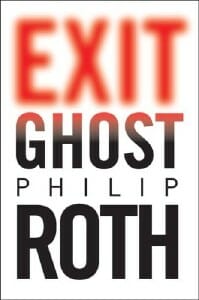
The Pen Is Mightier
Acclaimed writer’s impotent protagonist has his mind set on seduction
Philip Roth is a Man of Letters—an acclaimed, revered novelist approaching 75 years of age. He has won a Pulitzer Prize, two National Book Awards, two National Book Critics Circle Awards, three PEN/Faulkner Awards, the Gold Medal in Fiction from the American Academy of Arts and Letters, and he has received the National Medal of Arts at the White House. Furthermore, Roth is the only living American writer whose complete works are being published by the Library of America. Roth long ago transcended his Jewish upbringing, Jewish themes and Jewish characters, becoming a writer for all audiences.
Exit Ghost is Roth’s ninth novel featuring writer Nathan Zuckerman and his 28th book overall. I have friends, though, young and old, who will resist reading Exit Ghost because they feel left behind—having never delved into Roth’s oeuvre—and cowed by his Man of Letters reputation. But I say to them, put aside the trepidation. Roth’s texts may be sacred, but they’re also profane. If swear words, licentiousness and detailed descriptions of erectile and bladder dysfunction make you queasy, avoid Exit Ghost as well as most other Roth books. Otherwise, dive in, starting with Exit Ghost, or back at the very beginning (1959) with Goodbye, Columbus—or with The Ghost Writer, which is the ?rst Zuckerman novel. I cannot promise that you’ll become a Roth fan. I can promise, however, that you’ll read a superb stylist, an interesting, challenging thinker, and plenty of outrageous content.
Exit Ghost’s plot is split into four parts: After more than a decade in the New England countryside, hiding from news of the world such as terrorist attacks and the venal occupants of the White House, elderly novelist Nathan Zuckerman re-emerges in New York City society. The ostensible reason for this re-emergence? He needs medical attention for incontinence and perhaps sexual impotence. But this doesn’t explain everything.
There’s a love story, too (more precisely a lust story), that focuses on Zuckerman, earnest young male writer Billy Davidoff and equally earnest young female writer Jamie Logan, who’s married to Billy. Zuckerman wants to seduce Jamie, the object of Billy’s adoration. If Zuckerman is sexually impotent, he ?gures, he will need to content himself with a psychological seduction. In any case, he wants to possess the young woman, like he has possessed so many women before (though it’s been a long time).
Roth’s book is also a send-up of the biographical craft, as Zuckerman tries to block the attempt by Richard Kliman, yet another earnest young writer, to reveal the life of S.I. Lonoff, Zuckerman’s long-dead mentor and inspiration. Not so incidentally, this young writer/biographer is the former lover of Jamie, the young woman Zuckerman intends to seduce. Because of misplaced jealousy and a fear that Kliman will reveal a terrible secret about Lonoff, Zuckerman becomes obsessed with halting the biographical effort. This storyline meshes nicely with the current debate over the nature of biography, which some literary critics fear has devolved into pathography.
Exit Ghost is, lastly, an examination of loyalty, as Zuckerman chances to become reacquainted with Amy Bellette, the woman—once physically and intellectually alluring, now aged and sickly—who decades earlier served as Lonoff’s lover and muse.
Exit Ghost is not a great novel. I doubt if any literary critics, or even Roth’s fans, will claim otherwise. Some of the meetings with Amy seem contrived. Some of the dialogue Zuckerman imagines with Jamie is absolutely contrived. Richard, the biographer, is so plainly a caricature that he makes it di?cult to suspend disbelief. But a weak novel by Roth is more worthy than a strong novel by a lesser author, which means almost everybody.
As with Roth’s other novels, this one is quite likely to leave some readers feeling bereft, others uplifted, and still others with a complicated stew of thoughts and emotions. Certain types of novels—say romance or science ?ction or chick lit—tend to produce similar reactions in a spectrum of readers. Roth’s novels are so downright provocative that they lead to disparate reactions. How can it be otherwise when one of Roth’s most famous characters is known for incessant masturbating with a piece of liver?
Much of Exit Ghost is at least somewhat autobiographical, as is the case with other Zuckerman novels. So it’s logical to assume that they might spark anger. So many novelists and poets proclaim, “Let art be art; leave my real life out of this.” But not Roth, whose protagonist in more than one book is a character named Philip Roth. He isn’t denying the connection, no matter how much other novelists decry readers trying to ?nd intersections between art and an artist’s personal life. In The Facts, Roth calls Zuckerman “a being whose existence was comparable to my own and yet registered a more powerful valence, a life more highly charged and entertaining than my own.”